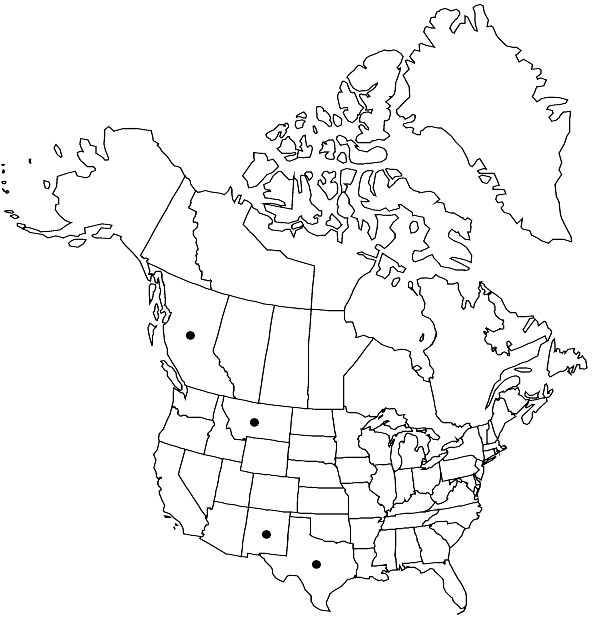Difference between revisions of "Entosthodon rubiginosus"
Moss Fl. N. Amer. 2: 82. 1935,.
FNA>Volume Importer |
imported>Volume Importer |
||
| (6 intermediate revisions by 2 users not shown) | |||
| Line 6: | Line 6: | ||
|place=2: 82. 1935, | |place=2: 82. 1935, | ||
}} | }} | ||
| − | |basionyms={{Treatment/ID/ | + | |basionyms={{Treatment/ID/Basionym |
|name=Funaria rubiginosa | |name=Funaria rubiginosa | ||
|authority=R. S. Williams | |authority=R. S. Williams | ||
| + | |rank=species | ||
| + | |publication_title=Bryologist | ||
| + | |publication_place=16: 37, plate 4, figs. 10–19. 1913 | ||
}} | }} | ||
|synonyms= | |synonyms= | ||
| Line 24: | Line 27: | ||
|elevation=moderate elevations | |elevation=moderate elevations | ||
|distribution=B.C.;Mont.;N.Mex.;Tex. | |distribution=B.C.;Mont.;N.Mex.;Tex. | ||
| − | |discussion=<p>Portions of the above description of Entosthodon rubiginosus are based upon the original one by Williams. This species has been found recently at two new locations in British Columbia (T. T. McIntosh, pers. comm.).</p> | + | |discussion=<p>Portions of the above description of <i>Entosthodon rubiginosus</i> are based upon the original one by Williams. This species has been found recently at two new locations in British Columbia (T. T. McIntosh, pers. comm.).</p> |
|tables= | |tables= | ||
|references= | |references= | ||
| Line 33: | Line 36: | ||
-->{{#Taxon: | -->{{#Taxon: | ||
name=Entosthodon rubiginosus | name=Entosthodon rubiginosus | ||
| − | |||
|authority=(R. S. Williams) Grout | |authority=(R. S. Williams) Grout | ||
|rank=species | |rank=species | ||
| Line 47: | Line 49: | ||
|publication year= | |publication year= | ||
|special status= | |special status= | ||
| − | |source xml=https:// | + | |source xml=https://bitbucket.org/aafc-mbb/fna-data-curation/src/2e0870ddd59836b60bcf96646a41e87ea5a5943a/coarse_grained_fna_xml/V27/V27_248.xml |
|genus=Entosthodon | |genus=Entosthodon | ||
|species=Entosthodon rubiginosus | |species=Entosthodon rubiginosus | ||
Latest revision as of 21:25, 5 November 2020
Plants 3–5 mm, pale yellow-green. Leaves slightly contorted when dry, usually broadly ovate, 1.5–2.4 mm; margins entire or nearly so; apices acute to subacute, with a subulate tip; costa percurrent to excurrent into subula; basal laminal cells rectangular (75–100 × 30–40 µm), distal cells irregularly hexagonal to oblong rectangular, little differentiated at the margins. Seta 5–6 mm, straight. Capsule reddish brown with age, pyriform from a narrowed neck about half as long as the sporangium, about 2 mm, changing little when dry and empty, sometimes mouth flaring; exothecial cells thickened, narrowly oblong, with orange-brown walls, transversely elongate in 4–6 rows below the mouth; operculum convex-conic; peristome absent or rudimentary, exostome teeth pale brownish yellow, barely extending beyond the capsule rim and terminating in a rather blunt to short-acute point, slightly papillose, 2–3 articulations present, endostome not seen. Calyptra cucullate, long-beaked, inflated around the capsule, large, smooth. Spores 25–35 µm, rough (probably bacculate-insulate).
Habitat: Sandy or silt-rich soil along river banks, gullies, seepage slopes, alkaline sloughs, and washes
Elevation: moderate elevations
Distribution

B.C., Mont., N.Mex., Tex.
Discussion
Portions of the above description of Entosthodon rubiginosus are based upon the original one by Williams. This species has been found recently at two new locations in British Columbia (T. T. McIntosh, pers. comm.).
Selected References
None.